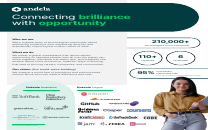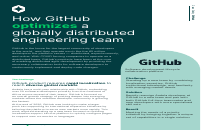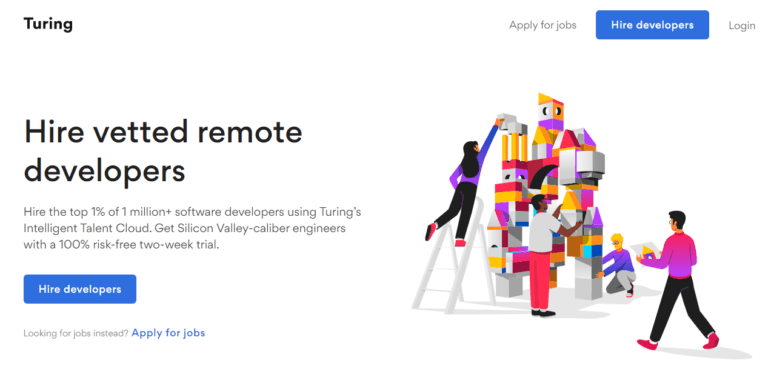
Andela
Founded Year
2014Stage
Series E | AliveTotal Raised
$374.61MValuation
$0000Last Raised
$200M | 3 yrs agoRevenue
$0000Mosaic Score The Mosaic Score is an algorithm that measures the overall financial health and market potential of private companies.
+101 points in the past 30 days
About Andela
Andela is a company that specializes in connecting highly-skilled global technology talent from emerging markets with leading companies to scale their technology teams quickly and cost-effectively. The company offers services such as software engineering, data science, and cloud engineering solutions, facilitated by an AI-powered talent matching platform. Andela's Adaptive Hiring models provide flexible engagement options for businesses seeking to fill specific roles, manage projects, or integrate talent into existing teams. It was founded in 2014 and is based in New York, New York.
Loading...
Andela's Product Videos


ESPs containing Andela
The ESP matrix leverages data and analyst insight to identify and rank leading companies in a given technology landscape.
The freelancing platforms market caters to businesses needing contract help for specific projects or departmental functions. These platforms link companies with professionals in fields such as marketing, engineering, and design, usually for a commission fee. Some platforms emphasize their pre-vetting process or provide reviews of freelancers. Certain providers focus on offering access to top-tier …
Andela named as Leader among 9 other companies, including Upwork, Fiverr, and Freelancer.
Andela's Products & Differentiators
Andela Technology Network
Network of 175,000 technologists all over the world. Allowing you to find pre-vetted tier-one technology talent for your teams faster and cheaper than you can in-house.
Loading...
Research containing Andela
Get data-driven expert analysis from the CB Insights Intelligence Unit.
CB Insights Intelligence Analysts have mentioned Andela in 1 CB Insights research brief, most recently on Dec 22, 2021.
Expert Collections containing Andela
Expert Collections are analyst-curated lists that highlight the companies you need to know in the most important technology spaces.
Andela is included in 2 Expert Collections, including HR Tech.
HR Tech
5,909 items
The HR tech collection includes software vendors that enable companies to develop, hire, manage, and pay their workforces. Focus areas include benefits, compensation, engagement, EORs & PEOs, HRIS & HRMS, learning & development, payroll, talent acquisition, and talent management.
Unicorns- Billion Dollar Startups
1,249 items
Andela Patents
Andela has filed 1 patent.

Application Date | Grant Date | Title | Related Topics | Status |
|---|---|---|---|---|
12/8/2022 | Application |
Application Date | 12/8/2022 |
|---|---|
Grant Date | |
Title | |
Related Topics | |
Status | Application |
Latest Andela News
Oct 31, 2024
By | October 31, 2024 Originally slated to unfold at Moonshot 2024 , where “Building for the World” headlined discussions, my conversation with Maya Horgan-Famodu, Founder and Managing Director of Ingressive Capital which has seeded some of Africa’s most successful startups, continued despite a clash of schedules. As it turned out, the timing couldn’t have been more relevant: African founders are increasingly looking beyond their home continent, eyeing global markets for growth, sustainability, and competitive edge. *** For African tech founders, breaking out of local markets and going global has gone from aspirational to essential. While expanding internationally is not without challenges, the benefits of tapping into a broader market can be transformative. “The data is clear,” Maya tells WT. “Our portfolio companies that expanded globally are raising significantly more capital and growing nearly twice as fast as those focused solely on local markets.” Maya’s Ingressive Capital, through its USD 10 M Fund I and USD 50 M Fund II, has backed leading startups such as Paystack , which was acquired by fintech heavyweight Stripe for over USD 200 M, as well as fast-growing businesses like Mono ( Series A led by Tiger Global and Y Combinator alum), Carry1st ( Series A led by Andreessen Horowitz , Google, Riot Games & AET), among others. The allure of global reach: Why founders are looking abroad From Moove and Flutterwave to Kuda , Asaak , and Bamboo, which today announced expansion to Canada , Africa’s most ambitious tech companies are increasingly eyeing international markets. Their leaders have recognised that global demand offers greater potential than remaining within local boundaries. Maya points to companies like Paystack, whose early strategic focus on infrastructure laid the groundwork for international success and made them attractive for international acquisition. “Their initial 18 months were dedicated to building a strong local foundation, achieving a 95% success rate in local payment processing before expanding abroad.” “Paystack’s global ambitions and execution made them attractive for international acquisition while maintaining strong local market leadership,” she adds. Several African founders have followed a similar blueprint, including Andela ’s co-founder Iyin Aboyeji, whose developer training platform began in Nigeria before becoming a talent hub for global companies like Microsoft and Google. Aboyeji’s experience echoes the evolving landscape: while local success is critical, it often serves as a stepping stone for greater reach. The real potential, he and other African founders have found, lies in building products with universal appeal rather than limiting scope to the complexities of African markets. But there are barriers to going global Despite the compelling success stories, building for the world isn’t without its unique obstacles. Customer acquisition costs in developed markets can be three to five times higher than those in African markets, Maya observes. Additionally, African founders face challenges around establishing international networks and securing working capital for global expansion. “Most African founders are still building their international networks,” says Maya, adding that these founders often lack access to the resources that Silicon Valley counterparts may take for granted. Furthermore, Victor Asemota, a notable Nigerian tech veteran and thought leader, believes that “building for Africa is hard” due to the continent’s diverse languages, cultural divides, and underdeveloped, fractured markets. Asemota’s advice? “Don’t build for Africa, think global.” He argues in a somewhat prescient 2018 musing that founders should prioritise creating products that transcend geographic and cultural boundaries. African diversity, while often a celebrated strength, can complicate scaling efforts, Asemota opines. He figures building for global markets can help African startups avoid being restricted by regional constraints and appeal to a much broader audience. “I believe that the African opportunity is not in Africa. It is more about what Africa can do for the world and not what the world or Africans can sell to Africa,” he writes. Building the foundations locally—And why that matters Maya and other investors urge a balanced approach: develop a strong base locally but plan and prepare for global expansion from day one. Companies like Flutterwave and Chipper Cash embody this “glocal” strategy. Both brands first gained traction by solving specific local payment problems, then scaled internationally by applying their operational insights to global markets. Flutterwave, for instance, facilitated USD 16 B in transactions by 2022 and now serves markets beyond Africa, proving that African companies can thrive both at home and abroad. Maya emphasises the importance of using Africa as a proving ground, a place to refine solutions in challenging environments. “Africa’s digital economy is projected to reach USD 712 B by 2050,” she says, “but founders don’t need to choose between local and global markets.” Rather, a foundation of operational excellence locally can be a launchpad for global competitiveness. Local focus meets global ambition Balancing global aspirations with local relevance can be tricky. African startups, especially those in fintech and asset finance, often encounter different regulations, consumer behaviours, and infrastructure in global markets. This is often a drag but could also be advantageous sometimes. Asaak, an asset financing startup from Uganda, expanded into Mexico last year, where they found that credit demand and lending interest rates paralleled Africa’s needs, but local regulations and infrastructure were more conducive to scaling their business. On its part, Nigerian-born Moove, a vehicle financing startup for ride-hailing, has found greener pastures in Asia and the UK and recently entered the US and Mexico, having soared but also suffered on the homefront where it faced economic and operational difficulties . According to Maya, a winning approach lies in maintaining a high standard of core functionality that addresses local needs while adding global layers. This “layered” strategy, she notes, involves “using local success as a proof of concept for global expansion” and adapting business models to meet diverse market demands. Andela’s initial model is another case in point: by training African software developers for global clients, they not only addressed local employment needs but also eventually met worldwide demand for highly skilled professionals, as Andela ultimately morphed into a global marketplace for tech talent hiring. From local Champions to global players: The playbook As the founder of Nigeria’s first female-owned tech fund and one of the youngest to launch a venture capital (VC) fund in Sub-Saharan Africa, Maya says her mission centres on guiding African founders to balance local impact with global expansion. Her work spans multiple initiatives: Ingressive for Good, a nonprofit focused on cultivating technical talent for African startups, and Ingressive Advisory, a firm that has helped over 50 international companies enter African markets. This approach has attracted international capital, with 80% of Ingressive Capital’s limited partners managing their own later-stage funds. She also tells WT that the VC fund has achieved a Distributed to Paid-In (DPI) ratio greater than 1x, implying the fund has returned more money to investors than they originally invested. “Our approach combines deep local understanding with a global perspective,” Maya explains. “We’ve created thousands of jobs across Africa, achieved notable exits, and maintained strong portfolio performance. But what really matters is helping founders navigate both local realities and global opportunities.” This balance of strong local roots and global bridges, she notes, allows Ingressive to connect authentically with young founders, fostering innovative solutions that resonate locally and globally. Maya recommends that to set themselves up for global success, African startups need a careful mix of adaptability, resilience, and resourcefulness. Maya identifies three critical areas: World-Class Execution: Companies must focus on delivering exceptional product quality, customer experience, and robust operational systems. Strategic Market Entry: Maya advises founders to prioritise partnerships with local experts when entering new markets. “Founders who understand customer needs and establish local partnerships have a competitive advantage,” she explains. Clear Unit Economics and Transparency: International investors are increasingly interested in African startups but require operational transparency and strong unit economics to build trust. “The most successful capital raises we’ve seen share a common approach,” Maya says, “founders invest significant time in building relationships with investors before actually raising capital.” Building for the World As African startups continue to grow in ambition and capability, their journey is inspiring a new generation of founders who see the value in building globally. In Maya’s words, “It’s not a matter of choosing between local and global; it’s about building solutions that can thrive in both.” Her advice rings especially true in light of recent successes which demonstrate how an “Africa-first” mindset is no longer a constraint but an advantage when combined with global thinking. While building for the world may present unique hurdles, African tech’s impact is expanding, taking homegrown ideas to new markets and showing that solutions created on the continent can meet demands well beyond its borders. Most Read
Andela Frequently Asked Questions (FAQ)
When was Andela founded?
Andela was founded in 2014.
Where is Andela's headquarters?
Andela's headquarters is located at 580 Fifth Avenue, New York.
What is Andela's latest funding round?
Andela's latest funding round is Series E.
How much did Andela raise?
Andela raised a total of $374.61M.
Who are the investors of Andela?
Investors of Andela include Chan Zuckerberg Initiative, Spark Capital, Generation Investment Management, SoftBank, Whale Rock Capital Management and 28 more.
Who are Andela's competitors?
Competitors of Andela include Snaphunt, Resilient Coders, Bloom Institute of Technology, Fusemachines, Turing and 7 more.
What products does Andela offer?
Andela's products include Andela Technology Network.
Who are Andela's customers?
Customers of Andela include Stax, Wellthy, Mastercard and GitHub.
Loading...
Compare Andela to Competitors

Turing operates as a technology company. The company offers an artificial intelligence (AI) enabled platform that matches companies with vetted remote developers and teams, providing services ranging from staff augmentation to fully managed services. Turing primarily serves businesses in need of engineering talent. It was founded in 2018 and is based in Palo Alto, California.
Toptal is a company that focuses on providing a network of top freelance talent in the fields of software development, design, finance, product management, and project management. The company's main service is to enable businesses to hire these freelancers for their important projects, offering a range of expertise across numerous technologies and industries. Toptal primarily serves sectors such as healthcare, consumer products, financial services, industrials, communications, media, entertainment, technology, and automotive. It is based in Palo Alto, California.
Braintrust operates as a decentralized talent network in the recruiting and staffing industry, leveraging AI to connect companies with skilled professionals. The platform offers AI-driven recruiting solutions to efficiently match vetted knowledge workers with enterprises seeking to fill technical roles, while maintaining a transparent hiring process. Braintrust primarily serves the technology sector, offering access to a global pool of talent for project-based work and long-term contracts. It was founded in 2018 and is based in San Francisco, California.
Lemon.io is a platform focused on connecting early-stage startups with vetted offshore engineers in the tech industry. The company offers services such as providing startups with full-time or part-time developers who are a good fit for their projects. Lemon.io primarily serves the startup industry. It is based in Ukraine.
SVAcademy is a company focused on career development and training in the education and business sectors. The company offers intensive training programs for job seekers, preparing them for entry-level positions in Sales or Business Development. It also provides professional coaching and career transition support to its graduates. It was founded in 2017 and is based in San Francisco, California.
ThirstySprout specializes in technical talent acquisition and team building within the technology sector. The company offers services such as AI-assisted sourcing and vetting of candidates, outsourced development, and comprehensive hiring solutions to build high-performing engineering teams. ThirstySprout primarily serves high-growth companies and startups looking to scale their technical teams quickly and efficiently. It was founded in 2016 and is based in Seattle, Washington.
Loading...
